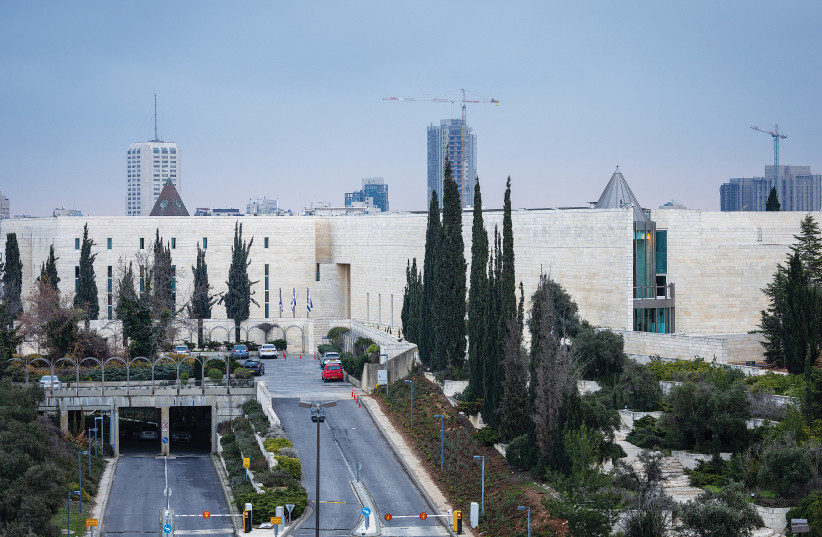The right to protest is central to any democracy. Our First Amendment guarantees the right of the people to peaceably assemble and to petition the government for a redress of grievances. Protests in democracies are generally directed against executive and legislative actions, rarely against the judicial branch.
This is because generally in democracies, the judiciary plays a limited role in the lives of its citizens and so citizens rarely have much to protest about. But in both the United States and Israel, where their Supreme Courts are more activist, protests against judicial decisions have taken center stage.
In the US, the High Court’s decision overruling Roe v. Wade has generated strident protests, some directed personally against the justices who voted against a woman’s right to choose. An armed man was caught near the home of Justice Brett Kavanaugh shortly before the decision was announced but after it had been leaked. His goal may have been to assassinate the justice whom he believed would cast the swing vote against Roe v. Wade. Fortunately, he was arrested before he could do any harm.
Peaceful but deeply annoying protests have frequently been conducted in front of the homes of justices. Section 1507 of the Criminal Code prohibits such protests if they are intended to influence judicial decisions. Here’s what the statute provides: “Whoever, with the intent of interfering with, obstructing or impeding the administration of justice or with the intent of influencing any judge, juror, witness or court officer, in the discharge of his duty, pickets or parades near [a] residence occupied or used by such judge, juror, witness or court officer... shall be fined... or imprisoned not more than one year or both.”
Some judges and scholars have raised constitutional concerns about the applicability of this statute to justices of the Supreme Court and other appellate judges appointed with a life tenure. They are deemed to be immune from the pressures of protests, whereas trial judges and jurors are far more likely to be influenced by protests.

These constitutional concerns may explain why the Justice Department has been unclear about whether to prosecute peaceful protesters who frequently appear in front of the homes of justices, in violation of the explicit terms of this statute, but perhaps are engaging in constitutionally protected protests.
For the most part, protests directed against American judges and other public officials have been peaceful. Occasionally, however, protests have gotten out of hand and have caused violence against people and property, including occasional deaths. Protests in other countries, such as France and the Netherlands, have been more violent.
Israeli protests responsible and peaceful
THE ISRAELI protests, generated by widespread opposition to the proposed weakening of its Supreme Court, have been models of civility and peacefulness. Nearly every weekend, thousands of angry demonstrators have cheered speakers railing against the judicial reforms proposed by the Netanyahu administration. They are furious at these proposed reforms and believe they will undercut Israel’s democratic character.
But despite their understandable anger, the protesters have behaved admirably. So has the government. Prime Minister Benjamin Netanyahu, who is the main target of these protests, has not tried to stop them. Rather, he has simply asked the protesters to behave responsibly, which the vast majority have done.
The international media has focused obsessively on the Israeli protests, largely agreeing with the objections voiced against the proposed reforms. They have ignored the positive aspects of these protests: namely, that they have been conducted within the spirit of Martin Luther King and Mahatma Gandhi – nonviolent and respectful.
Moreover, the protests have worked, at least to a degree. They have forced the Netanyahu government to delay the consideration and implementation of the proposed reforms and encouraged centrists on both sides to consider reasonable and balanced compromises.
There is no guarantee that these protests will remain peaceful, especially if the government tries to push through the reforms without additional delay and compromise. But at the moment, the Israeli protests have served as a model for peaceful opposition to governmental actions and proposals.
The downside of large and boisterous protests is that they often harden the positions of extremists on both sides. In Israel, there have been protests both for and against the reforms, with the opposition massing far larger crowds.
Advocates of both positions have exaggerated the stakes in the dispute. Many who oppose the reforms claim that they will turn Israel into an autocracy, like Hungary, Poland and Turkey. Those who favor reforms believe that the current status quo endangers Israel’s democracy by allowing unelected judges to play too great a role in Israeli decisions. Both are wrong.
Although I personally oppose some of the reforms, such as giving the Knesset the power to override Supreme Court decisions on minority rights, I believe that Israel will remain a vibrant democracy regardless of whether or not some or even all of these reforms are enacted.
Indeed, the protests themselves, coupled with the reality that Israel has had five contentious and disputed elections over the past several years, demonstrate that the spirit of liberty is alive and well in the nation-state of the Jewish people and will endure regardless of the outcome of this contentious but healthy controversy about the proper role of the judiciary in a democracy.
The writer, Felix Frankfurter Professor of Law, emeritus, is the author of over 50 books, including Get Trump: The Threat to Civil Liberties, Due Process, and Our Constitutional Rule of Law (2023).
